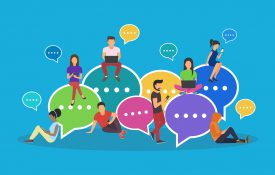-
This Is Your Brain Off Facebook
The world’s most common digital habit is not easy to break, even in a fit of moral outrage over the privacy risks and political divisions Facebook has created, or amid concerns about how the habit might affect emotional health. Although four in 10 Facebook users say they have taken long breaks from it, the digital platform keeps growing. A recent study found that the average user would have to be paid $1,000 to $2,000 to be pried away for a year. So what happens if you actually do quit? A new study, the most comprehensive to date, offers a preview. Expect the consequences to be fairly immediate: More in-person time with friends and family.
-
From Fruit Fly To Stink Eye: Searching For Anger’s Animal Roots
For comedian Lewis Black, anger is a job. Black is famous for his rants about stuff he finds annoying or unfair or just plain infuriating. Onstage, he often looks ready for a fight. He leans forward. He shouts. He stabs the air with an index finger, or a middle finger. To a scientist, Black looks a lot like a belligerent dog, or an irritated gerbil. "Practically every sexually reproducing, multicellular animal shows aggressive behavior," says David Anderson, a professor of biology at Caltech and co-author of the book The Neuroscience of Emotion."Fruit flies show aggression." When I relay that last bit to Black, he's skeptical. "Really?" he says.
-
‘Becoming Human’ Review: The Defining Neediness of Humans
When Edward O. Wilson’s “Sociobiology” was published in 1975, setting forth a comprehensive biological analysis of animal (and human) social behavior, its supposed political implications made the book controversial for some people. For others—including myself—it was a magisterial blending of ethology, ecology and evolutionary theory. Michael Tomasello’s “Becoming Human” should be less controversial. But it is comparably magisterial—merging primatology, developmental psychology, cognitive psychology and evolution. Mr. Tomasello’s goal is widely shared but rarely achieved: identifying the biopsychological wellsprings of human uniqueness.
-

For Professionals, Personality May Be Best in Moderation
It’s easy to see how someone with low levels of conscientiousness or extraversion might struggle in the workplace, but people with extremely high levels of these traits can face hurdles of their own too.
-

Data Show No Evidence That Teens’ Social Media Use Predicts Depression Over Time
Longitudinal data from adolescents and young adults show no evidence that social media use predicts later depressive symptoms.
-
Americans Are Becoming Less Racist and Homophobic, According to New Research
The resurgence of openly racist attitudes in the Trump era has led many observers to question whether the apparent reduction in prejudice in recent years was an illusion. New research provides a reassuring answer. Researchers find that both conscious and unconscious bias regarding race and sexual orientation declined significantly between 2007 and 2016. For racial attitudes, this change was largely generational, whereas the more relaxed attitudes toward sexuality were found in the population as a whole. That said, Americans are hardly ready to give up all our prejudices.

